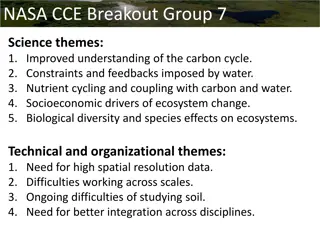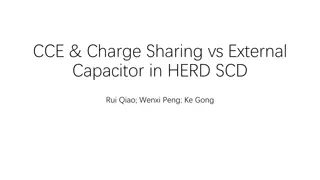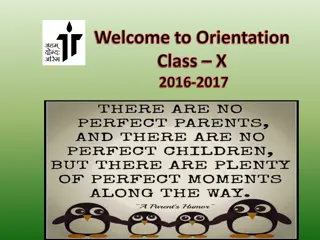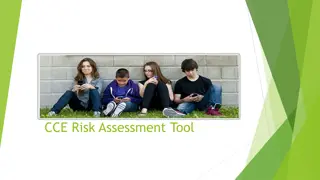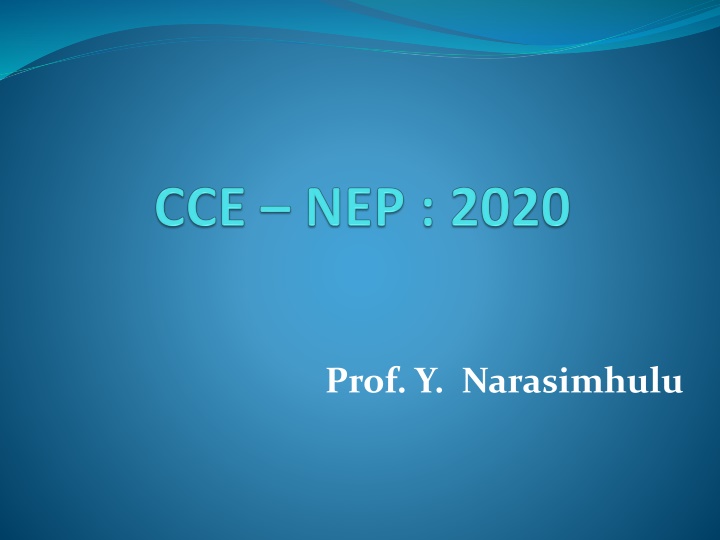
Enhancing Educational Framework: Curriculum, Pedagogy, Assessment, and Student Support
Explore suggested changes in revamping curriculum, pedagogy, assessment, and student support in education. Understand the definitions of assessment practices, pedagogical approaches, and the use of resources for effective learning. Discover the shift towards blended learning and diverse assessment methods for better student progress evaluation.
Download Presentation

Please find below an Image/Link to download the presentation.
The content on the website is provided AS IS for your information and personal use only. It may not be sold, licensed, or shared on other websites without obtaining consent from the author. If you encounter any issues during the download, it is possible that the publisher has removed the file from their server.
You are allowed to download the files provided on this website for personal or commercial use, subject to the condition that they are used lawfully. All files are the property of their respective owners.
The content on the website is provided AS IS for your information and personal use only. It may not be sold, licensed, or shared on other websites without obtaining consent from the author.
E N D
Presentation Transcript
Suggested Changes Revamping curriculum, pedagogy, assessment, and studentsupport. WHY ? WHAT ? HOW ?
Some Definitions Assessment focuses on measuring learning progress achievement, while Evaluation focuses on making judgements and decisions on collected data. Formative assessment covers the range of informal diagnostic tests a teacher can use to assist the process of learning by their students. Continuous assessment is a form of educational examination that evaluates a student s progress throughout a prescribed course. It is often used as an alternative to the final examination system.
Pedagogical approach Practical skills, including an appreciation of the link between theory and practice, will constitute an important aspect of the teaching-learning process. Teaching methods, guided by such a framework, may include lectures supported by group tutorial work; practicum and field-based learning
the use of prescribed textbooks and e-learning resources and other self-study materials; field based learning/project, open-ended project work, some of which may be team-based; activities designed to promote the development of generic/transferable and subject- specific skills; and internship and visits to field sites, and industrial or other research facilities etc.
Educational Institutions must replace face-to- face, long teacher lectures with modularised audio/video capsules of 10-12 minutes. Further, they need to be reinforced the learning with follow up quizzes, group activities, problem solving exercises and breakout classroom discussions before going to next module. Blended Learning
Learning assessment A variety of assessment methods that are appropriate to a given disciplinary/subject area and a programme of study will be used to assess progress towards the course/programme learning outcomes. Priority will be accorded to formative assessment. Evaluation will be based on continuous assessment, in which sessional work and the terminal examination will contribute to the final grade
Sessional work will consist of class tests, mid- semester examination(s), home-work assignments etc., as determined by the faculty in charge of the courses of study. Progress towards achievement of learning outcomes will be assessed using the following:
Time-constrained examinations; closed-book and open-book tests; Problem-based assignments; practical assignment laboratory reports; observation of practical skills; Individual project reports(case-study reports); team project reports; Oral presentations, including seminar presentation; viva voce interviews; Computerized adaptive assessment.
Experiential Learning Methods CourseAugmentation Methods Industry-Institute Symbiosis InnovativeMethods Liberal Education Co-Curricularactivities 1. Productdevelopment 2. Development of innovative experiments in each course 3. Open ended expt. 4. Demonstration 5. MATLAB / anyother software use: course wise 6. Coding usingPython / R programmingfor relevant problem in a course 7. Virtual Experiments developments 8. Design Thinking 1. Tests / Quizzes 2. Assignments on mind blogging problems 3. NPTEL/MOOC course certification 4. Viva voce on topic in a course 5. Seminar 6. Rresearching on topic / literaturereview 7. Group of students writing a book 8. Case Study building 1. Debate 2. Groupdiscussion 3. Essay /extended essay 4. Reading a bookand presenting 5. Concept map for cognitiveabilities 6. Articles in newspapers/relevant magazines 7. Role play 8. Visual communication: charts, photos, diagrams,paintings 1. Industrial visit/inplant training 2. IndustrialTour 3. Survey on topic in a course 4. Expert lecture / guest lecture& consolidation 5. Industrial solving 6. VirtualInternships 7. Mini projects 8. Interviewing experts on a topic and reporting 9. Survey on startups in a course 10. Short internship, courserelated 1. Participation in technical symposium & reporting 2. Writing ajournal paper / paper presentation in conferences 3. Posterpresentations 4. Writing awhitepaper on newtechnologies 5. Projectexhibitions problem subject
Course Augmentation Methods Tests / Quizzes Assignments on mind blogging problems NPTEL/MOOC course certification Viva voce on a topic in a course Seminar Researching on a topic / literature review Group of students writing a book Case Study building
Innovative Methods Product development Development of innovative experiments in each course Open ended Experiment. Demonstration MATLAB / any other software use: course wise Coding using Python / R programming for relevant problem in a course Virtual Experiments developments Design Thinking
Industry-Institute Symbiosis Industrial visit / in-plant training Industrial Tour Survey on topic in a course Expert lecture / guest lecture & consolidation Industrial problem solving Virtual Internships Mini projects Interviewing subject experts on a topic and reporting Survey on startups in a course Short internship, course related
Liberal Education Debate Group discussion Essay / extended essay Reading a book and presenting Concept map for cognitive abilities Articles in newspapers/ relevant magazines Role play Visual communication: charts, photos, diagrams, paintings
Co-Curricular Activities Participation in technical symposium & reporting Writing a journal paper / paper presentation in conferences Poster presentations Writing a whitepaper on new technologies Project exhibitions
Assessment Internal Exams Experiential Learning 50 50 OR Internal Exams Experiential Learning End Exam 30 30 40
.decide yourself What are the changes to be made Can you revamp your Internal exam Any Three out of Five methods Experiential Learning can be considered for PG and any TWO methods may be preferred for UG students. End exam : Questions can be on application based or advanced areas.

